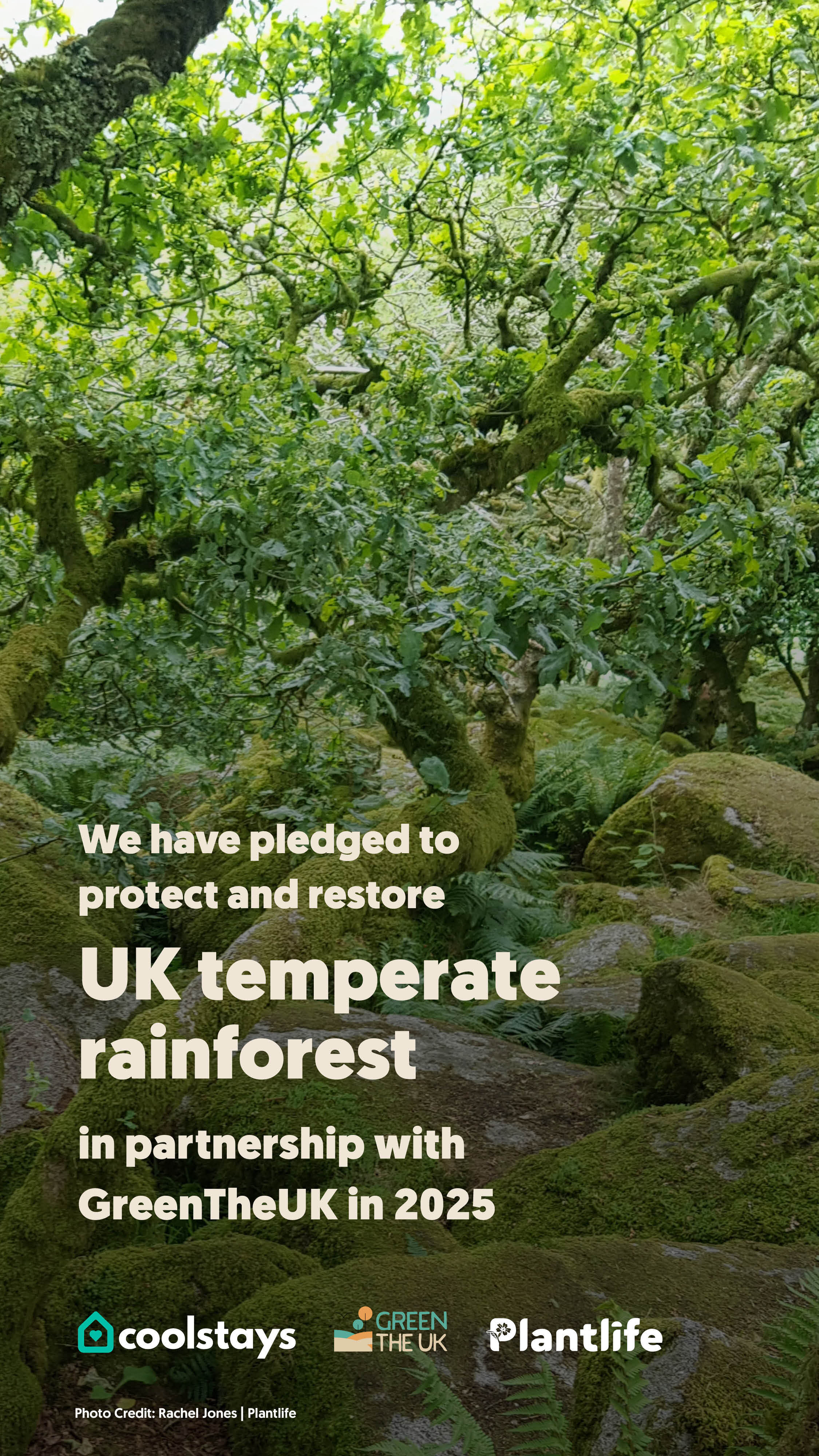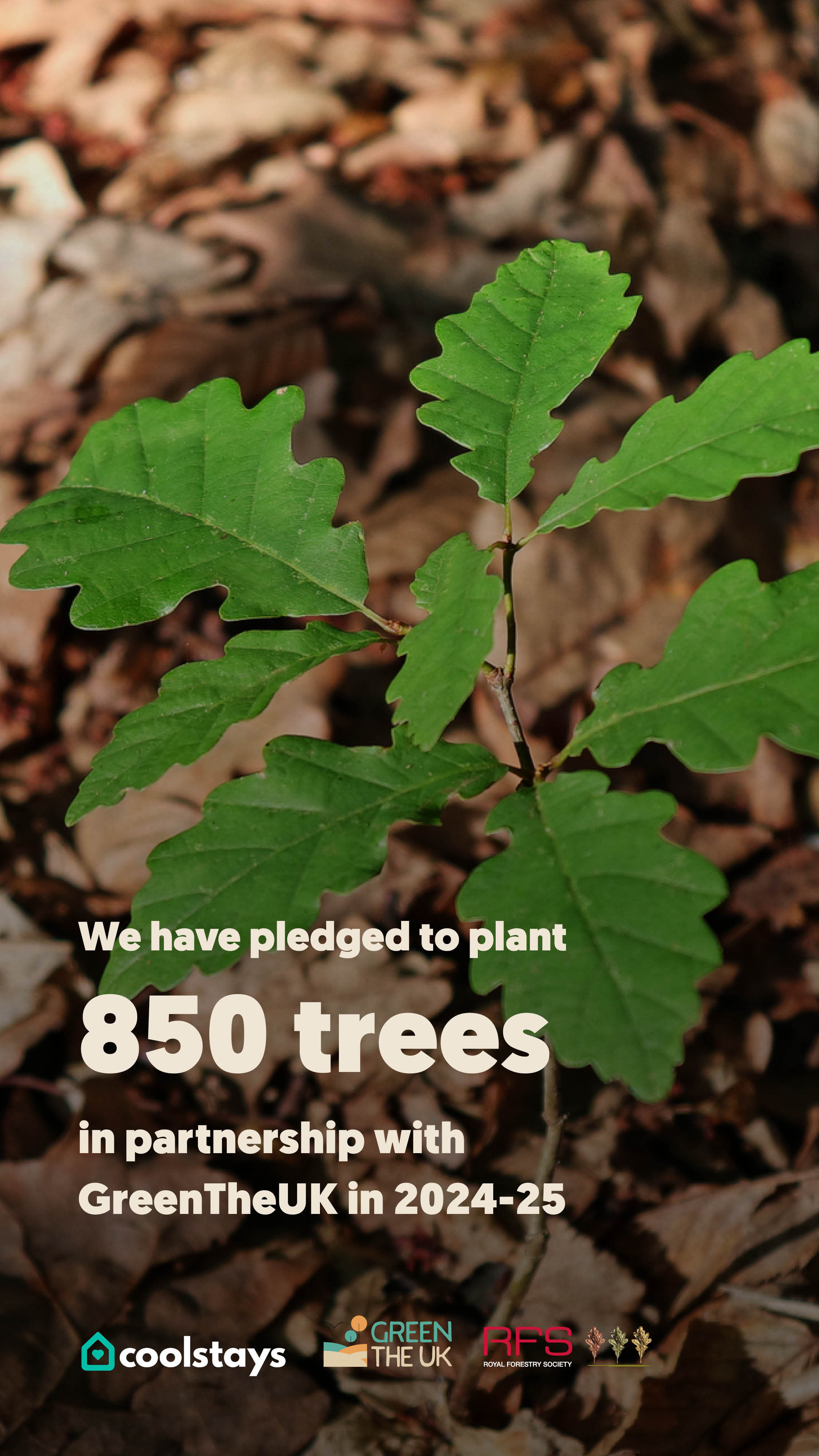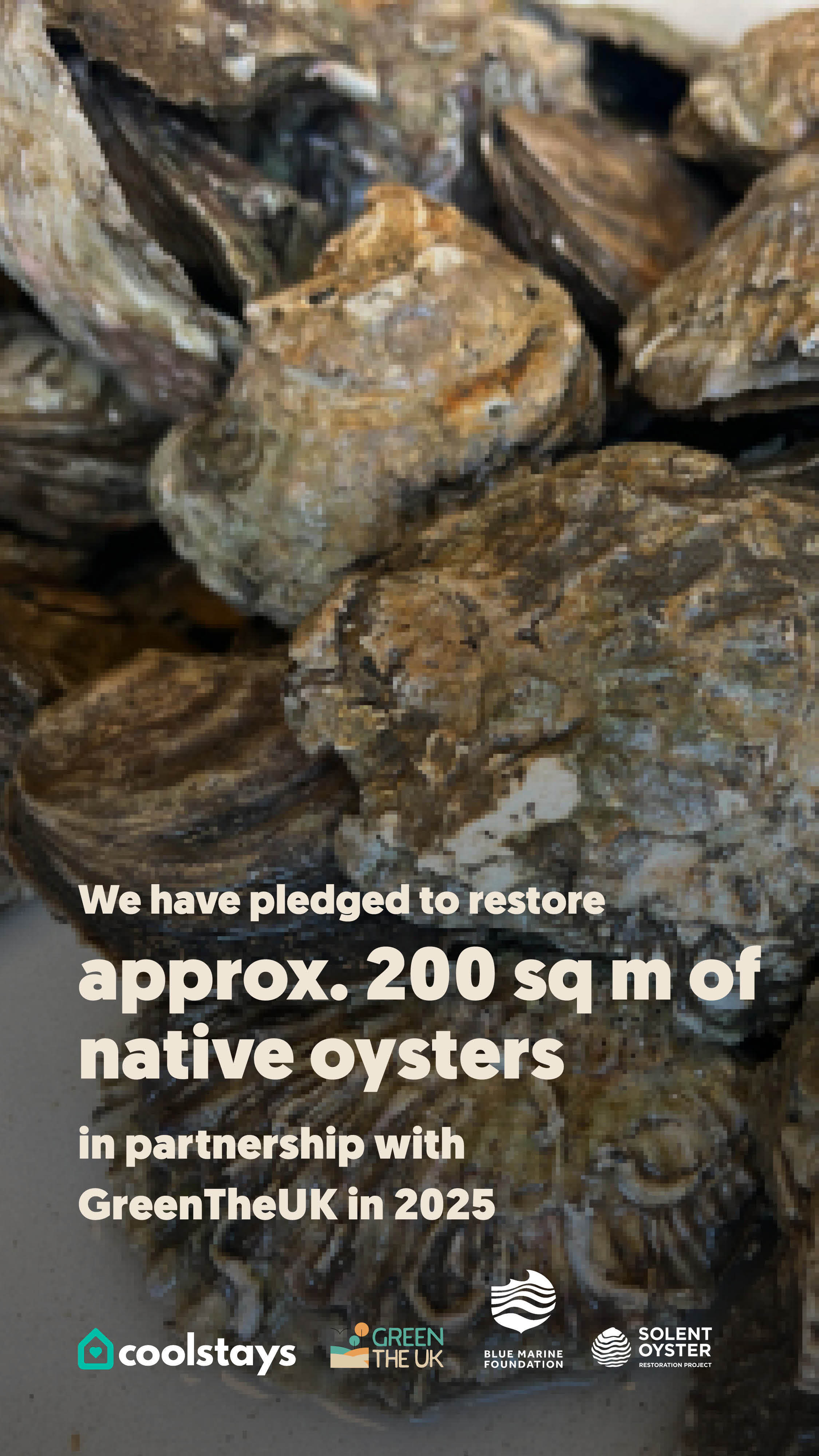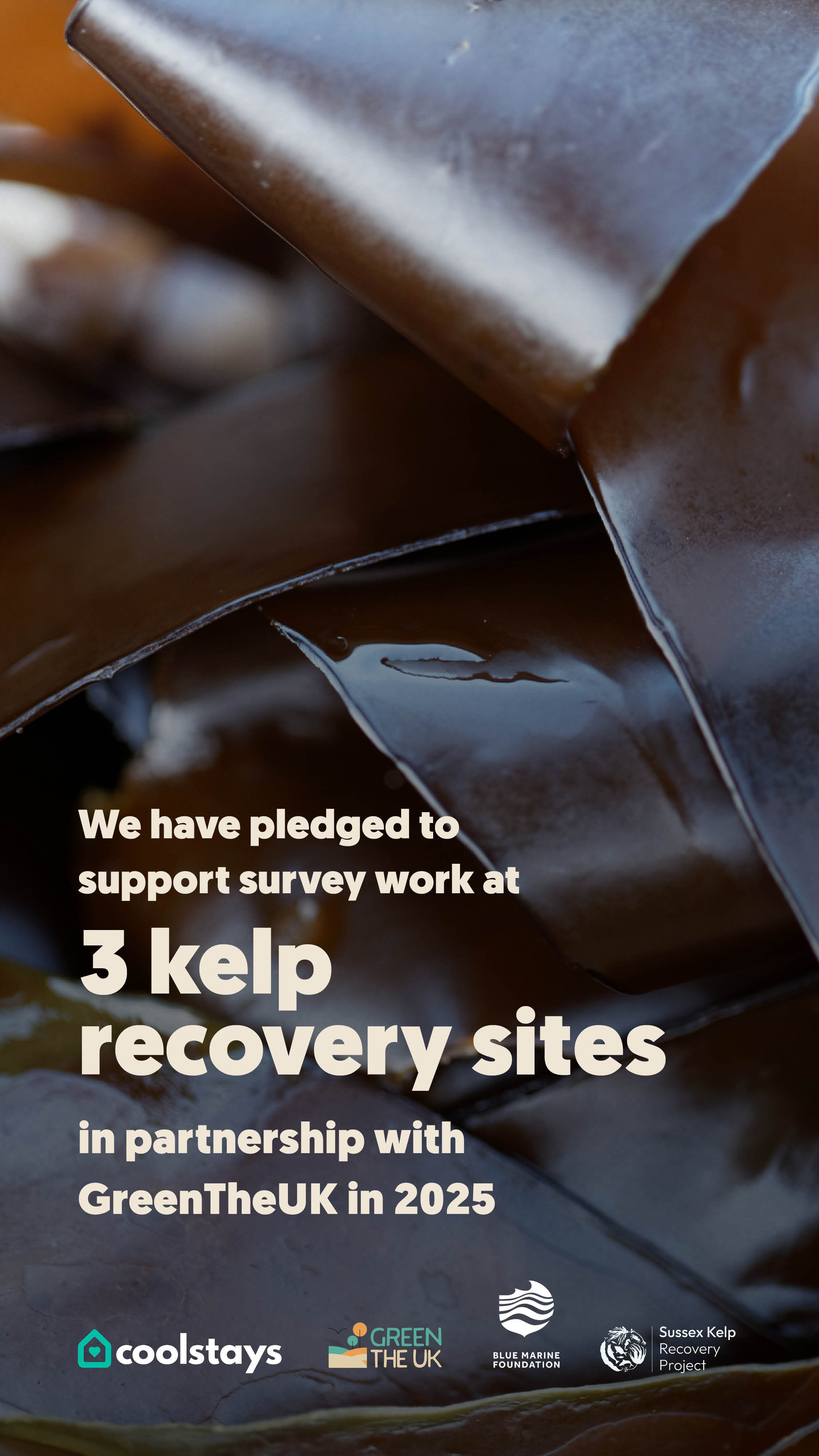
Coolstays & GreenTheUK
Supporting wildlife projects with a direct local impact.
Since the beginning of 2022, as part of our commitment to be a carbon neutral business, we've taken some immediate action by donating a proportion of our revenue to support local wildlife projects.
Coolstays are working with GreenTheUK who distribute our funds to UK wildlife projects that are delivering a measurable local impact - conservation and restoration projects on land and sea, delivered by experts in their field.
You can see a timeline of the projects we've been supporting here.
For 2025/26, we've chosen to support 4 of their partnerships that resonate most with our team.

Coolstays is helping fund the protection and restoration of temperate rainforest sites in the South West.
The United Kingdom hosts a very special habitat, temperate rainforests, which are much rarer than their tropical counterparts. As the name suggests, they’re damp and humid with low temperatures, but that allows them to host unbelievably high levels of biodiversity with unique species not found anywhere else in the UK.
Humidity-loving species such as mosses, lichens, and fungi are found in abundance here. The dense foliage allows for numerous insect species to thrive, in turn leading to at-risk species of birds, such as the pied flycatcher, thriving amongst the damp woodland.
These special forests are one of the oldest living ecosystems in the UK, being used for timber and hunting for centuries. In recent generations, they have come under a stronger threat from deforestation, invasive species, pollution, climate change, and diseases. To help protect and cultivate new growth of the rainforests we still have, Plantlife has stepped in to take action. Conservation methods including halo-thinning, grazing management, baseline surveys, and active monitoring by experts will be utilised to restore these bastions of biodiversity and to protect the endangered species within. In 2025, two areas of focus for the GreenTheUK and Plantlife partnership will be Devon and Cornwall.

Coolstays are funding the planting of 800 trees in Devon (400 trees) and North Yorkshire (400 trees).
Supporting the The Royal Forestry Society (RFS) to create resilient treescapes for the
future.
GreenTheUK grants will be awarded to RFS and RSFS members who want to plant trees to increase
resilience to pests, diseases, or climate change. We have joined forces to help people plant trees
that will survive and thrive into the future.
The Royal Forestry Society (RFS) is the largest and longest established educational charity
promoting the wise management of trees and woods in England, Wales and Northern Ireland. We also
work with the Royal Scottish Forestry Society (RSFS). The RFS and RSFS inspire passion and
excellence in woodland management so that all woodlands are actively managed and valued for their
social, economic, and environmental benefits.
The RFS aims to inspire passion and excellence in woodland management through education and
knowledge-sharing.
For over 20 years, Teaching Trees has been connecting schools with local woodlands across England
and Wales.
The RFS believes bringing neglected woods back into management and sharing knowledge on how to
manage woods to a high standard is vital to the long-term health of our woods and trees.

Coolstays are funding the restoration of 292m2 of native oysters in the Solent.
Restoring the status of the native oyster in Solent waters so that a healthy, self-sustaining oyster
population is present to provide several key ecosystem services.
Oysters are ecosystem engineers, filtering water to remove pollutants, sequestering carbon and
providing habitats for hundreds of species. Yet 95 per cent of Europe’s and 85 per cent of the
world’s native oyster beds and reef habitats have been lost due to overfishing and pollution, making
this one of the world’s most imperilled marine habitats.
The Solent, the 20-mile strait that separates mainland England from the Isle of Wight, once had the
largest oyster fishery in Europe. In 1978, 450 vessels were involved in oyster fishing and 15
million oysters were removed in that year alone. However, since this peak, the oyster population has
declined significantly and in 2013 the fishery collapsed, due to a number of linked environmental
pressures. Oyster restoration is a high priority at the national, European and global level; oysters
are classified as a priority species in the UK’s Biodiversity Action Plan.

Coolstays are funding 4 kelp restoration survey sites.
Kelp forests once stretched 40 kilometres along the Sussex coastline, creating one of the most
productive and biodiverse environments on the planet. Kelp forests provide shelter, feeding and
nursery grounds for many marine species including cuttlefish, lobster, seabream and bass. Kelp also
has the potential to store carbon, aiding in the fight against climate change, while improving water
quality and reducing coastal erosion by absorbing the power of ocean waves. Over the next five years
we aim to restore five million oysters, using both broodstock cages and seabed restoration. We will
conduct community outreach, using volunteer programmes and school visits to raise awareness of the
importance this cornerstone species and the need for restoration.
Since 1987 however, over 96 per cent of Sussex’s kelp had been destroyed due to years of destructive
trawling and other human pressures.
To reverse this decline, the Sussex Inshore Fisheries and Conservation Authority proposed a byelaw
prohibiting trawling of over 300 square kilometres of seabed in 2019 with the aim for recovery of
the lost kelp forest and protection of essential fish habitats and fish populations. Blue Marine
worked with the Sussex Wildlife Trust, Marine Conservation Society and Big Wave Media as part of the
Help our Kelp campaign to support the byelaw gaining overwhelming public support from almost 2,500
people.
In March 2021 the Nearshore Trawling Byelaw 2019 was approved creating one of the largest inshore
areas closed to trawling in England and the first kelp restoration project in the UK. Sir David
Attenborough lent his support in the early stages providing a voice over for the campaign film and
welcomed the byelaw as a “landmark decision for the management of the UK’s coastal waters”.
Blue Marine is working with partners across Sussex to deliver the Sussex Kelp Restoration Project
and supports an extensive research programme to monitor the impacts and benefits of the byelaw for
wildlife and inshore fisheries. The research includes Baited Remote Underwater Video surveys to
monitor mobile benthic species, studies of crab and lobster populations and socio-economic surveys
with fishermen.